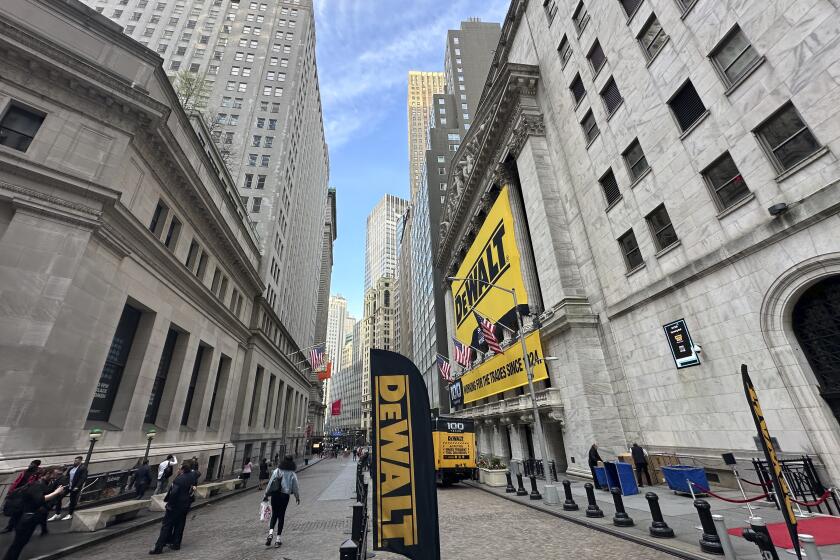Clinton-Greenspan Meeting Drives Up Bond Yields : Markets: Talk generates expectation that short-term interest rates are about to be boosted. Dow average finishes 30.51 higher in third-heaviest trading day in history.
A hastily convened meeting Friday between President Clinton and Federal Reserve Board Chairman Alan Greenspan at the White House sent bond market yields higher and generated broad expectation that the central bank will raise short-term interest rates at a key policy meeting next week.
Meanwhile, a late buying surge related to the expiration of futures and options contracts swept the Dow Jones industrial average sharply higher during one of the busiest sessions ever on Wall Street.
Clinton aides insisted there was nothing unusual about Friday’s meeting. There was “agreement that the fundamentals on the economy still seem sound,” Clinton aide Gene Sperling told reporters. “They did not discuss interest rate policy,” he added, and Clinton didn’t tell Greenspan whether he thinks the Fed should raise interest rates again in an effort to keep high inflation at bay.
But the fact that Greenspan canceled a longstanding speaking engagement in Houston for the one-hour audience with the President kicked Wall Street’s rumor mill into overdrive.
Many market observers speculated that Clinton summoned Greenspan to the White House in a last-ditch effort to stop him from raising short-term interest rates at Tuesday’s meeting of the Federal Open Market Committee, the central bank’s main policy board.
Others theorized that Greenspan initiated the meeting to warn Clinton that he planned a substantial rate hike at the committee meeting.
Both theories gave markets the willies. At the end of trading Friday, the yield on the Treasury’s 30-year bond had risen to 6.90% from 6.82% the day before. Stocks also recoiled early in the day before closing higher.
The Fed last engineered a rise in short-term rates Feb. 4, when it boosted the federal funds rate a quarter of a pointfor the first time in five years.
Friday’s White House meeting was “a big mistake,” said Charles Leiberman, managing director at Chemical Securities Inc. He said Greenspan now must raise short-term rates at least a quarter of a percent at next week’s FOMC meeting to maintain his credibility in financial markets. Anything less, he said, “will give the impression that Greenspan’s arm can be twisted by the Administration.”
Meanwhile, after hovering at modestly lower to higher levels throughout the day, the blue chip average jumped near the close of trading to finish up 30.51 points at 3,895.65, giving it a gain for the week of 32.95.
Broader market gauges also advanced in the late going, but less impressively than the Dow industrials did. The New York Stock Exchange composite index added 0.24, closing at 261.35, which was up 2.82 from a week earlier. The Standard & Poor’s 500 index rose 0.16 to 471.06 and added 4.62 in the week.
The buying wave also carried smaller stocks aloft. The Nasdaq’s composite index managed to dig out of a deficit and edge 0.08 past its previous record set Thursday to 803.93. The Russell 2,000, which tracks smaller capitalization stocks, finished at its third new high in a row at 271.08, up 1.29.
The so-called triple witching, the quarterly expirations of futures, stock index options and options on individual stocks, boosted volume on the New York Stock Exchange to 462.24 million shares, the third-heaviest total on record, and added to the market’s volatility. On Thursday, 303.95 million shares changed hands.
Despite the heavy buying, declining issues held a slight edge over advances on the NYSE.
Weakness in stocks overseas also weighed on the market. Hong Kong’s Hang Seng index plunged 380.82 points, or 4%, to 9,132.31, as institutions dumped blue chips and small investors joined the selling spree amid persistent interest rate concerns.
In Tokyo, selling by some institutional investors pushed the 225-share Nikkei average down 122.71 points to 20,469.45. Germany’s DAX index closed at 2,155.61, down 19.45 points on the day, while London’s Financial Times 100-share average dropped 37.6 points to 3,218.1.
Among the market highlights:
20th Century Industries fell 3 5/8 to 51 1/2 following news it would take a big first-quarter charge related to claims from the Northridge earthquake.
* Northwest Airlines made its debut on the Nasdaq, where it took top billing on the actives list. It closed at 13, the same as its initial price.
* General Electric gained 1 1/2 to 104 1/2. Late Thursday, an uninvited $2.2-billion takeover bid by General Electric’s GE Capital unit made for financial services concern Kemper was rejected by Kemper’s board. Kemper was unchanged at 60 3/4.
* Fears of higher interest rates were reflected in financial stocks. Citicorp sank 1 3/4 to 39 1/4 in heavy NYSE turnover of more than 34.8 million shares.
* RJR Nabisco, parent of R.J. Reynolds, rose 1/4 to 6 5/8 after Kidder Peabody upgraded the stock to a trading buy from neutral.
* King World Productions added 2 1/8 to 39. The company reportedly reached an agreement with Oprah Winfrey to continue distributing her top-rated talk show through the 1999-2000 television season.
* Micron Technology rose 5 1/4 to 88 1/2 on heavy volume of more than 1.4 million shares after CS First Boston raised its earnings estimates for fiscal 1994 and 1995 on the company.
* Monk-Austin rose 2 5/8 to 18 1/2. The company said it agreed to buy tobacco for R.J. Reynolds Tobacco Co. in the U.S. auction markets.
The Treasury’s main 30-year bond plunged 27/32 point, or $8.44 per $1,000 in face value.
Anthony Chan, an economist at Barclays de Zoete Wedd Government Securities Inc., said the Fed will probably raise the federal funds rate, the rate on overnight loans between banks, by a quarter of a percentage point. On Friday, the rate closed at 3.188%.
At the same time, the Clinton-Greenspan meeting sent gold prices soaring. Gold’s rally further depressed bond prices. The metal is bought as a hedge against inflation.
Gold closed on the New York Comex at $387.10 an ounce, up $4.70. Silver also rose, finishing at $5.41 an ounce, up 5.7 cents.
Meanwhile, the dollar advanced against other major currencies on expectations that the Fed will move to raise short-term rates.
Market Roundup, D4
DAILY DIARY (March 18, 1994)
30-year T-Bond: 6.90%
1-year T-Bill: 4.33%
Selected Interest Rates
Corporate AAA bonds: 7.50%
90-day CDs: 3.75%
3-month Treasury bills: 3.55%
Bank prime rate: 6.00%
Municipal bonds: 5.88%
Federal funds rate: 3.19%
Discount rate: 3.00%
Source: Federal Reserve Board






